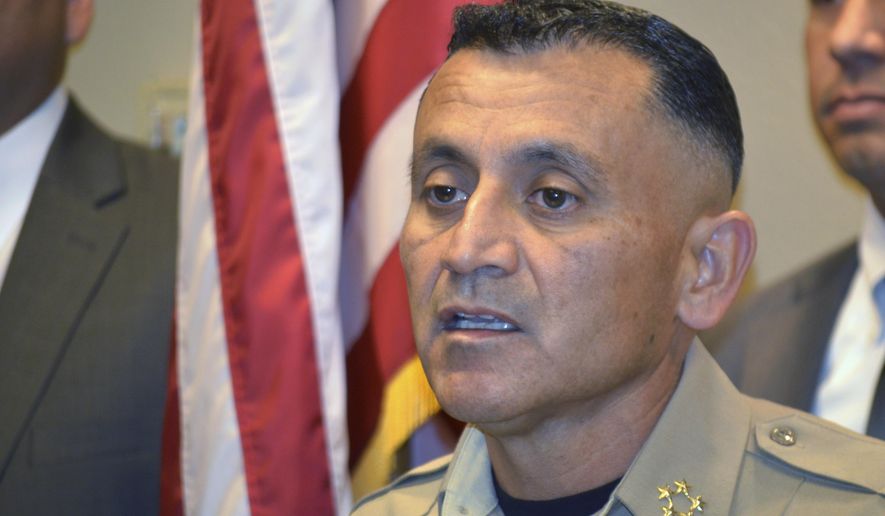SANTA FE, N.M. (AP) - President Trump focused on an open wound in the law enforcement community - the unsolved shooting death of the mother of two New Mexico state police officers - in announcing that federal agents, including Homeland Security officers, will surge into Albuquerque, Chicago and other U.S. cities in attempt to contain violent crime.
At the White House, Trump and U.S. Attorney General William Barr announced the expansion of an initiative against violent crime in Albuquerque and Chicago that includes an increase in federal agents and grant money for local law enforcement agencies. Barr said 35 agents are being assigned to Albuquerque.
They turned the microphone over to Sam Vigil to recount his early morning discovery on Nov. 19, 2019, that his wife, Jackie, had been shot and died in their Albuquerque driveway as she left to exercise at a gym.
“My wife didn’t deserve to be killed that way,” Vigil said. “We desperately need some help at going after crime rates.”
The announcement prompted immediate concerns among Democratic elected officials in New Mexico of federal overreach and the potential for new civil rights abuses in a city that has wrestled with issues of police brutality and reforms under a consent decree with the Department of Justice.
Gov. Michelle Lujan Grisham and Democratic Attorney General Hector Balderas said they will actively monitor federal law enforcement operations for any civil rights violations, while Albuquerque-based District Attorney Raùl Torrez said federal agents must stay within their traditional crime-fighting roles.
“If the Trump administration wishes to antagonize New Mexicans and Americans with authoritarian, unnecessary and unaccountable military-style ‘crackdowns,’ they have no business whatsoever in New Mexico,” Lujan Grisham said in a statement.
The Trump administration is facing a growing backlash - in the courts and on the streets - to sending federal agents from the Department of Homeland Security to Portland, Oregon, where protests have spiraled into violence, and vowing to do the same in other Democratic-led cities.
Barr drew a distinction between the federal response in Portland and the agents being dispatched to cities such as Albuquerque in coordination with local law enforcement.
“This is a different kind of operation, obviously, than the tactical teams we use to defend against riots and mob violence,” Barr said. “The operations we’re discussing today are very different. They are classic crime fighting.”
Trump warned that crime is spiraling out of control in American cities - including Democrat-led Albuquerque and Chicago.
The Democratic sheriff of New Mexico’s most populous county that includes Albuquerque traveled to the White House for discussion of the initiative - prompting a string of rebukes from fellow Democrats.
Bernalillo County Sheriff Manny Gonzales - who has been at odds on issues of policing, gun control and police body cameras with the state’s Democratic governor and Albuquerque’s Democratic mayor - defended the visit as an effort to secure federal assistance for a community contending with persistent crime, the pandemic and bursts of late-night rioting in downtown Albuquerque in June.
“For us, it’s much needed and we need to further our partnership. … This administration listened,” Gonzales said by telephone Wednesday from Washington.
U.S. Sen. Martin Heinrich called Tuesday on Gonzales to resign, amid uncertainty about the consequences of the sheriff’s White House visit.
“Instead of collaborating with the Albuquerque Police Department, the Sheriff is inviting the President’s stormtroopers into Albuquerque,” Heinrich said in a statement.
Gonzales said he won’t resign and called Heinrich’s comments “political guerrilla tactics.”
Usually, the Justice Department sends agents under its own umbrella, like agents from the Bureau of Alcohol, Tobacco, Firearms and Explosives or the Drug Enforcement Agency. But this surge effort will include Department of Homeland Security Investigations officers, who generally conduct drug trafficking and child exploitation investigations.
New Mexico Republican Party Chairman Steve Pearce said the federal response is appropriate given local crime rates, evidence of human trafficking in a border state and the need for adequate security surrounding national defense installations in Albuquerque - at Kirtland Air Force Base and Sandia National Laboratories.
“Calling these federal agents stormtroppers, there is nothing further from the truth,” Pearce said. “That’s the problem with the deep partisanship that’s dividing the country right now. It’s asinine to tell you the truth.”
Amid a wave of national protests over policing practices, Albuquerque Mayor Tim Keller has announced a proposal to create a city agency to focus on community safety by deploying social workers and other civilian professionals with a focus on violence prevention, mental health and homelessness.
Albuquerque authorities have struggled for years to contain both violent crime and police brutality.
The Albuquerque Police Department began implementing policing reforms years ago under a prior administration as part of a consent decree with the Justice Department. Federal authorities in 2014 issued a scathing report in response to a series of deadly police shootings in the city that pointed to patterns of excessive force, constitutional violations and a lack of training and oversight of its officers.
Crime began surging in some cities like Chicago, New York and Philadelphia when stay-at-home orders lifted. Compared with other years, crime in 2020 is down overall.




Please read our comment policy before commenting.